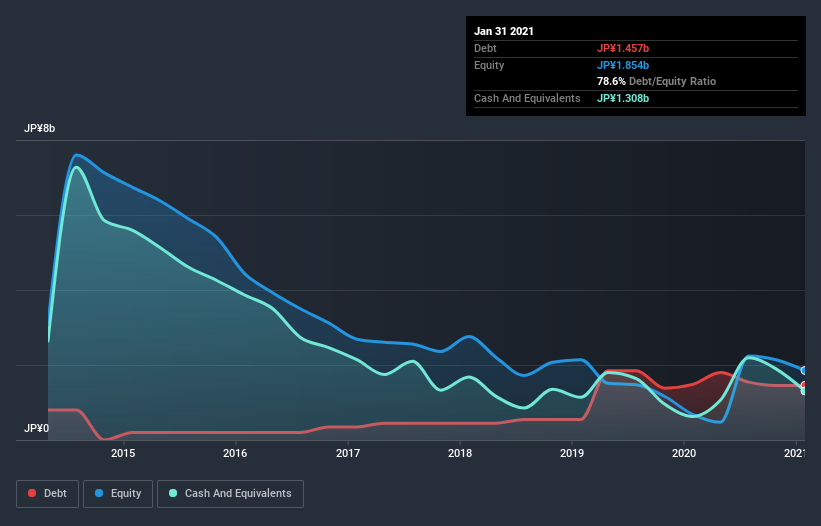Legendary fund manager Li Lu (who Charlie Munger backed) once said, 'The biggest investment risk is not the volatility of prices, but whether you will suffer a permanent loss of capital.' It's only natural to consider a company's balance sheet when you examine how risky it is, since debt is often involved when a business collapses. We can see that 3-D Matrix, Ltd. (TYO:7777) does use debt in its business. But the real question is whether this debt is making the company risky.
When Is Debt Dangerous?
Debt assists a business until the business has trouble paying it off, either with new capital or with free cash flow. Ultimately, if the company can't fulfill its legal obligations to repay debt, shareholders could walk away with nothing. However, a more usual (but still expensive) situation is where a company must dilute shareholders at a cheap share price simply to get debt under control. Of course, debt can be an important tool in businesses, particularly capital heavy businesses. The first step when considering a company's debt levels is to consider its cash and debt together.
See our latest analysis for 3-D Matrix
How Much Debt Does 3-D Matrix Carry?
As you can see below, 3-D Matrix had JP¥1.46b of debt, at January 2021, which is about the same as the year before. You can click the chart for greater detail. However, it does have JP¥1.31b in cash offsetting this, leading to net debt of about JP¥149.0m.

How Strong Is 3-D Matrix's Balance Sheet?
According to the last reported balance sheet, 3-D Matrix had liabilities of JP¥752.0m due within 12 months, and liabilities of JP¥1.06b due beyond 12 months. Offsetting these obligations, it had cash of JP¥1.31b as well as receivables valued at JP¥119.0m due within 12 months. So its liabilities outweigh the sum of its cash and (near-term) receivables by JP¥386.0m.
Since publicly traded 3-D Matrix shares are worth a total of JP¥11.2b, it seems unlikely that this level of liabilities would be a major threat. But there are sufficient liabilities that we would certainly recommend shareholders continue to monitor the balance sheet, going forward. But either way, 3-D Matrix has virtually no net debt, so it's fair to say it does not have a heavy debt load! When analysing debt levels, the balance sheet is the obvious place to start. But ultimately the future profitability of the business will decide if 3-D Matrix can strengthen its balance sheet over time. So if you want to see what the professionals think, you might find this free report on analyst profit forecasts to be interesting.
In the last year 3-D Matrix wasn't profitable at an EBIT level, but managed to grow its revenue by 36%, to JP¥871m. Shareholders probably have their fingers crossed that it can grow its way to profits.
Caveat Emptor
While we can certainly appreciate 3-D Matrix's revenue growth, its earnings before interest and tax (EBIT) loss is not ideal. Its EBIT loss was a whopping JP¥2.5b. When we look at that and recall the liabilities on its balance sheet, relative to cash, it seems unwise to us for the company to have any debt. So we think its balance sheet is a little strained, though not beyond repair. However, it doesn't help that it burned through JP¥2.5b of cash over the last year. So suffice it to say we consider the stock very risky. There's no doubt that we learn most about debt from the balance sheet. But ultimately, every company can contain risks that exist outside of the balance sheet. We've identified 3 warning signs with 3-D Matrix (at least 1 which is a bit concerning) , and understanding them should be part of your investment process.
Of course, if you're the type of investor who prefers buying stocks without the burden of debt, then don't hesitate to discover our exclusive list of net cash growth stocks, today.
When trading 3-D Matrix or any other investment, use the platform considered by many to be the Professional's Gateway to the Worlds Market, Interactive Brokers. You get the lowest-cost* trading on stocks, options, futures, forex, bonds and funds worldwide from a single integrated account. Promoted
Valuation is complex, but we're here to simplify it.
Discover if 3-D Matrix might be undervalued or overvalued with our detailed analysis, featuring fair value estimates, potential risks, dividends, insider trades, and its financial condition.
Access Free AnalysisThis article by Simply Wall St is general in nature. It does not constitute a recommendation to buy or sell any stock, and does not take account of your objectives, or your financial situation. We aim to bring you long-term focused analysis driven by fundamental data. Note that our analysis may not factor in the latest price-sensitive company announcements or qualitative material. Simply Wall St has no position in any stocks mentioned.
*Interactive Brokers Rated Lowest Cost Broker by StockBrokers.com Annual Online Review 2020
Have feedback on this article? Concerned about the content? Get in touch with us directly. Alternatively, email editorial-team (at) simplywallst.com.
About TSE:7777
3-D Matrix
3-D Matrix, Ltd. developing, manufacturing, and selling self-assembling peptide technology in Japan and internationally.
Mediocre balance sheet with low risk.
Market Insights
Community Narratives




